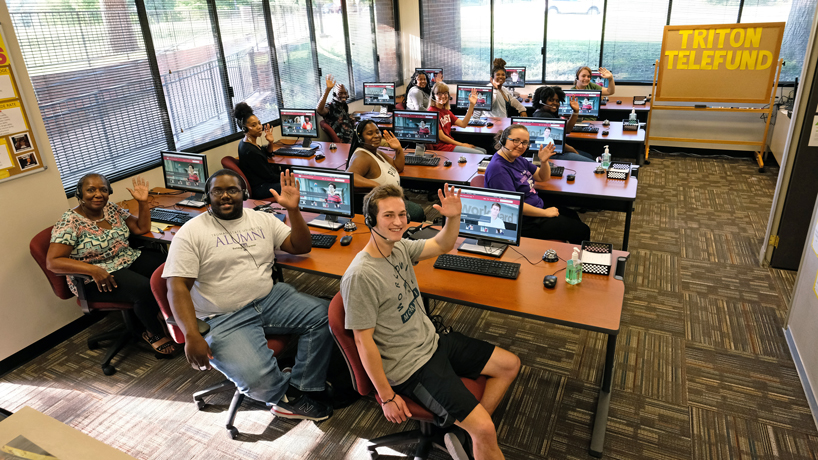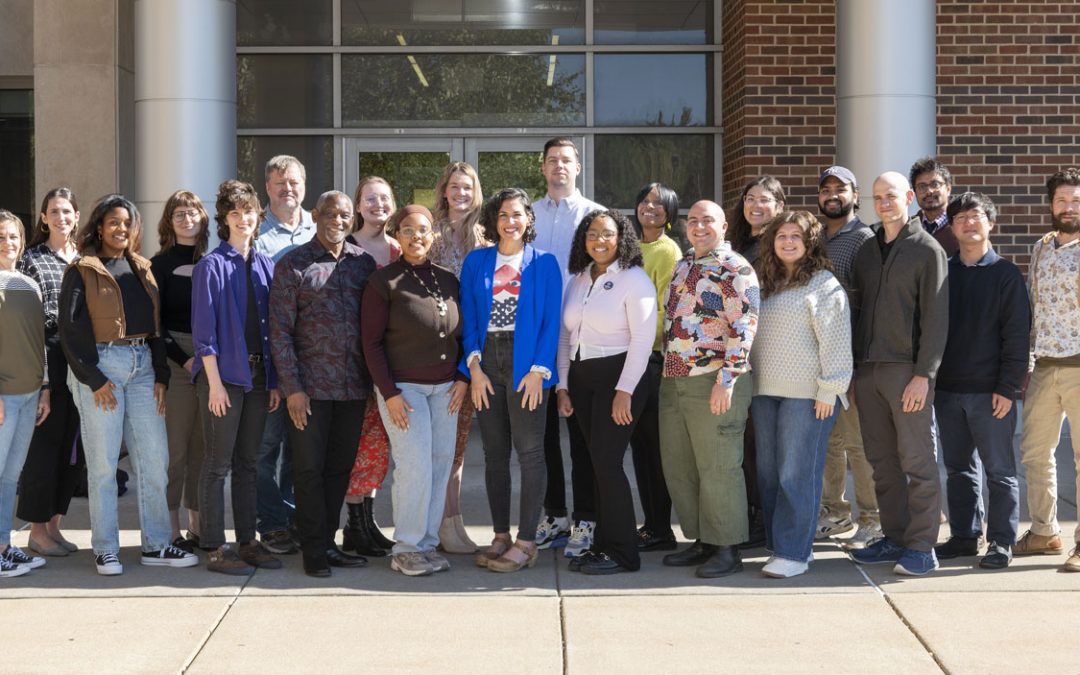
James Bragado, manager of Annual Giving, moved quickly at the onset of the COVID-19 pandemic to keep the Triton Telefund running remotely. Since April 19, UMSL students have been maintaining vital university functions from home, making connections with alumni and taking donations for the UMSL Strong Scholarship Fund. (Photo by August Jennewein)
Ashton Hartman has worked at the Triton Telefund – the University of Missouri–St. Louis’ alumni engagement and fundraising call center – since August. But it’s the calls she’s made recently amid the COVID-19 pandemic that have been the most memorable.
The freshman political science major vividly recalled the hour-long conversation she had with an alumna on maternity leave. They touched on the pandemic and their lives during quarantine, forging an undeniable connection.
“She and her husband are both nurses, and her husband works on the COVID floor,” Hartman said. “We were talking about the impact that the coronavirus has had. They have kids at home, and her husband watched them open their Easter baskets through a window on the front porch for the safety of the family. It was nice to talk to her for an hour about life before and during the pandemic and what we’re doing to distract ourselves.
“She wasn’t a political science major, but we still talked a little bit about politics. It’s nice to talk to alumni who treat you as an adult and have these ‘big kid’ conversations with you.”
Whether the call ended in a donation or not, Hartman was happy to engage with a fellow Triton during a difficult time.
She is one of 18 UMSL students working remotely to keep the Triton Telefund running while campus is closed. James Bragado, manager of Annual Giving, said the move has maintained vital fundraising and outreach functions and benefitted students who remain employed.
“The call center, thanks to the Promise and Opportunity Scholarship match that was going on this year, had raised just shy of $300,000 before we shut down,” Bragado said. “It was very critical that we got this call center back up and running once we found out that we had to close.”
Things were changing quickly during the onset of COVID-19, and Bragado’s office did what it could to adapt. While in-person classes were still in session, the call center enacted a 10-person limit and spaced callers 6 feet apart. Once campus officially closed on March 18, Bragado contemplated the obstacles to running the Triton Telefund remotely.
His two biggest concerns were access to proper technology and payment card industry compliance. He was also unsure if students would be willing to work during a crisis. But, with a little help, those issues were sorted out and the operation got back up and running by April 19.
“Thankfully, with excellent work by Mark Monroe and the IT team and Telephone Services, they were able to quickly address our concerns,” Bragado said. “They really went above and beyond to come up with a creative way that we could employ students at home while still adhering to PCI compliant confidentiality practices. That was creating a soft phone system and giving students access to our calling software.”
Things started strongly considering the circumstances. The first night brought in $575 with only four students calling, and efforts have ramped up since then. One week of recent calls secured about $6,000 for the university. Bragado said donations are averaging about $95, but the largest thus far has been $1,000. He noted that’s not unheard of in the call center, but it’s especially meaningful at the moment.
Apart from working remotely, other adjustments have been made as well. Previously, donations were going to the Promise and Opportunity Scholarship, and the university was matching the funds. Due to looming budget cuts, donations are now going to the UMSL Strong Scholarship Fund. The approach to calls has also changed.
“There has been a shift in the script,” Hartman said. “We’re putting a lot of emphasis on how the alumni we’re calling are doing. We have a lot of alumni resources that we’re trying to get out to them if they do need anything. We’re not ignoring COVID because you really can’t ignore it. We’re acknowledging the fact that we’ve had to suspend all of our alumni events for June. We’ve had to make a bunch of changes, and we’re just trying to relay to alumni that we’re still here for them.”
The pandemic has unexpectedly left everyone with a shared experience, and Bragado added that people who have been quarantined in their homes have leapt at the chance for human interaction.
“A lot of people want to talk to somebody,” Bragado said. “They want to talk about the pandemic and get it off their chests – empathize and hear that other people are struggling, too.”
Normally, the Triton Telefund would wrap up its operations by May 30, but this year, students are working until the end on the fiscal year on June 30.
“My real goal right now is for these students to keep having great conversations with these folks to let them know what we’re doing right now,” Bragado said. “If that results in a donation, that’s fantastic. That’s what we would like, but the main point of our calls is really to build relationships with them and remind them about their time at UMSL.”
Hartman is deeply involved on the UMSL campus as a member of Zeta Tau Alpha, treasurer of the Associated Students of the University of Missouri and Student Government Association representative for the UMSL Democrats, but as a student who relies on financial aid, she finds working for the Triton Telefund particularly rewarding.
“These alumni wouldn’t have donated if we didn’t call them,” she said. “Knowing that I’m making the effort to call them and getting to talk to them, letting them know what their money is going toward and why it’s a good cause, it just means the world to me because you get to see firsthand the difference that we’re making here.”














